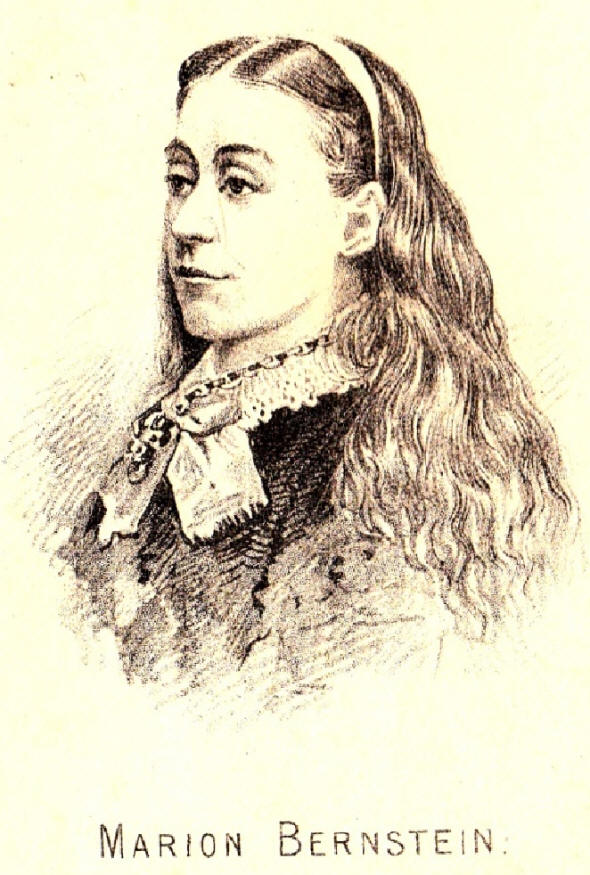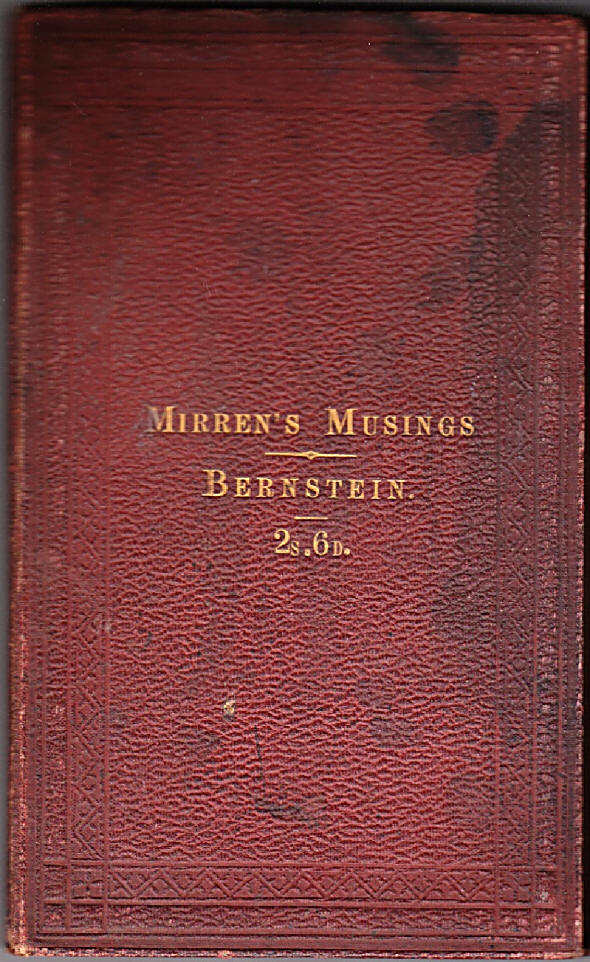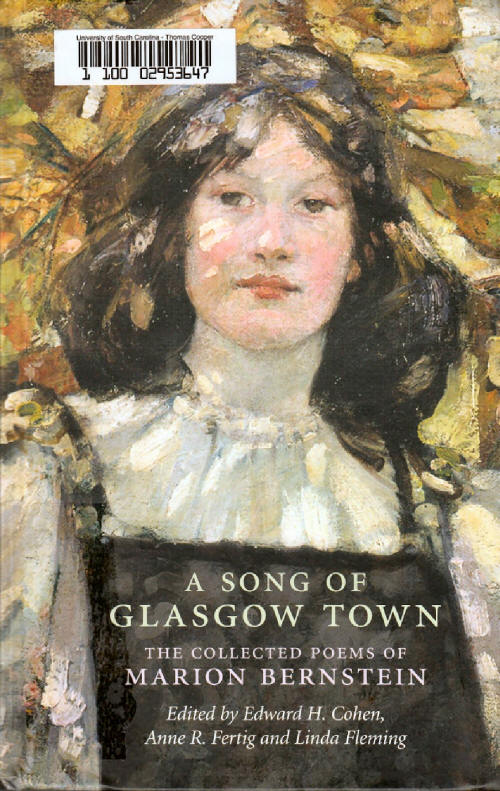|
Edited
by Frank R. Shaw, FSA Scot, Dawsonville, GA, USA
Email:
jurascot@earthlink.net
It is always good to
hear from Patrick Scott, longtime supporter and contributor to the pages of
RBL!. Patrick is Editor, Studies in Scottish Literature and
Distinguished Professor of English, Emeritus, at the University of South
Carolina Libraries. He has been a loyal friend of Robert Burns Lives!
for many years, and it is always a joy to have him contribute to our web
site. You will find the following article on the relationship between poet
Marion Bernstein and Robert Burns to be like other articles submitted by
Patrick - interesting, fascinating, and with something new to consider.
Welcome back home, Patrick! (FRS: 8.8.13)
A Victorian Admirer
Writes Back:
Marion Bernstein and Robert Burns
By
Patrick Scott
Till twenty years ago,
almost no one had heard of the Glaswegian feminist poet Marion Bernstein
(1846-1906). Like most other late Victorian Scottish writers, Bernstein was
not exempt from the idealization of Robert Burns that characterized the
period, but she also had a distinctive, feisty independence in some of what
she wrote about his work. A recently-published book, the first collected
edition of Bernstein’s poetry, makes it possible for the first time to
examine the full range of her responses to Burns.
Marion Bernstein was
born in London, the second child of a German immigrant father and a
well-brought-up English mother. Following an unnamed childhood illness, she
wrote, “I grew up to womanhood feeble and lame,” doomed to spend “years on
my couch.” Her father’s business failure, growing debt, and mental breakdown
led to his death in 1861, leaving the mother and family to scrape together a
living running a lodging house, and eventually moving to Glasgow in 1874,
where the invalid Marion taught music and began publishing poetry. Over the
next thirty years, she published nearly 200 poems, and one of her poems was
included in D.H. Edwards’s multivolume anthology Modern Scottish Poets,
vol. 1 (1880). Over time, however, Bernstein’s poetry, locally published in
ephemeral format, became more or less invisible.

Frontispiece portrait
of Marion Bernstein
From
Mirren’s Musings (Glasgow,1876)
G. Ross Roy Collection, University of South Carolina Libraries
Current awareness of
Bernstein’s writings began when Tom Leonard included a few of her poems in
his anthology Radical Renfrew (1990), and since then interest has
grown steadily. Other Scottish anthologists have followed Leonard’s lead;
significant articles about or including Bernstein have been published by
Edward H. Cohen and Linda Fleming, Florence Boos, Valentina Bold, and
others; and she has been at least mentioned in several recent Scottish
literary histories. Her scathing reaction to domestic violence, male
complacency, and economic exploitation both in Glasgow and during the
Clearances has rightly attracted critical attention. Often her poems seem
almost impromptu responses to something in the newspaper, as with her
“Wanted A Husband,” a satirical rewrite on the conventional idealized
Victorian wife:
Wanted a
husband who doesn't suppose,
That all
earthly employments one feminine knows-
That she'll scrub, do the cleaning, and cooking, and baking,
And plain
needlework, hats and caps, and dressmaking.
Do the family washing, yet always look neat,
Mind the
bairns, with a temper unchangeably sweet,...
Men expecting as much, one may easily see,
But they're
not what is wanted, at least not by me.
(Song
of Glasgow Town, p. 28)
In 1875, long before the
Suffragette Movement, Bernstein offered a vision of a woman-dominated, and
much improved, political future:
I dreamt that the
nineteenth century
Had entirely passed
away,
And had given place to a
more advanced
And very much
brighter day. ...
There were female chiefs
in the cabinet,
(Much better than
males I’m sure)
And the Commons were
three-parts feminine,
While the Lords
were seen no more.
(Song of Glasgow Town,
p. 53; and cf. p. 76).
However, despite the
increased interest in Bernstein, it has remained very difficult to get hold
of her poetry. Most of it was originally published in Scottish newspapers,
chiefly during the 1870s in the Glasgow Weekly Herald and Glasgow
Weekly Mail, and almost half the newspaper poems have never been
reprinted. Bernstein collected many of her earlier poems in her only book,
Mirren’s Musings (1876), but copies are exceedingly rare. The
international bibliographical database WorldCat lists copies of the book
only in the British Library and the National Library of Scotland, so that
Ross Roy was overjoyed when a couple of years ago Ken Simpson found him one
that he could add to the Roy Collection.

Marion Bernstein’s
only book (Glasgow, 1876)
From the G.
Ross Roy Collection
That there was still
much more of Bernstein’s writing to be discovered was made clear in 2009
when an article by Prof. Cohen and Dr. Fleming reprinted twelve poems that
Bernstein had not included in her book, and Cohen and Fleming followed up in
2010 with the first full account of Bernstein’s life. Now the same
scholars, with Ann Fertig, have edited the very first collected edition of
Bernstein’s poems, under the title A Song of Glasgow Town (Glasgow:
Association for Scottish Literary Studies, 2013). With over three hundred
pages, nearly 200 poems, a thirty-page introduction, and bibliographical
information, it allows examination for the first time of the full range of
Bernstein’s work.

A Song of Glasgow
Town: The Collected Poems of Marion Bernstein
edited by
Edward H. Cohen, Anne R. Fertig, and Linda Fleming
Glasgow:
Association for Scottish Literary Studies, 2013.
ISBN 978-1-906841-13-1
One aspect of
Bernstein’s work that the new collection makes much more visible is her
continuing interest in Robert Burns and his poetry. The poems Bernstein
wrote directly about Burns are perhaps less original than those in which she
engaged with what he was saying, and wrote back in answer to him, just as
she had written verses in answer to her contemporaries. None of them are
well known to Burnsians, and it seems worth examining them one by one.
Bernstein’s two poems
directly about Burns himself were both written too late for inclusion in
Mirren’s Musings. Both are interesting as spirited defenses of Burns
against Victorian adulation and detraction, but neither shows her at her
poetic best: I have been ruthless in excerpting them here. The first,
published in the People’s Journal (February 3, 1883), contrasts the
financial struggles of Burns in his lifetime with the amount that her
Victorian contemporaries spent on commemorating him. The ASLS editors
comment acutely that she is writing as much about her own sense of being
neglected as about Burns:
While others will tell
of thy triumphs,
Thy genius, and thy
fame,
I can only think of thy
sorrows
Whene'er I hear thy
name.
I think of the heart of
a poet
Always unfit to bear
Sad poverty's heavy
burden
Of sordid, ceaseless
care.
Poor Burns! how thy
sensitive nature
Fretted beneath the
strain
Of want and debt and
dependence,
A threefold, galling
chain. …
Ah! the price of thy
meanest statue
Might then have changed
thy fate;
Dost thou see the wealth that is lavished
Over thy grave, too
late?
Dost thou witness how
oft the poet
Is deemed of little
worth
Till the voice of the
minstrel is silent,
And the spirit passed
from earth? …
(Song of Glasgow Town,
p. 158)
Bernstein’s second poem
about Burns, published in the Glasgow Weekly Herald (January 29,
1887), confronts Victorian criticism of Burns’s sexual behavior, charitably
arguing that Burns repented of his sins (by marrying Jean), and that his
critics should accept his sincerity:
Oft it moves my
indignation
That the envious eye
discerns
Nought of holy
exaltation
In the life of Robert
Burns.
On his faults will many
dwell,
His repentance few will
tell. …
Those who love the
Psalms of David
Should not sneer at
Robert Burns;
Each has sinned, and
each is savéd,
Each to God repentant
turns;
And God never hides His
face
From a soul that seeks
His grace. …
Thus hath Scotland's
sweetest poet
Been defamed and
slandered long;
Those who love him best
should show it
Nor permit this cruel
wrong.
Suffer not reproach to
rest
On the mem'ry of our
best.
Now let Scotland's
justice waken
For the Bard whose songs
she sings;
Let detraction's dust be
shaken
Off, as from an angel's
wings.
Even God would ne'er
rebuke
Any sins his saints
forsook. …
(Song of Glasgow
Town, pp. 183-185)
Burns’s poems were among
the touchstones that Bernstein used when the poetry editor of the Weekly
Mail decided to exclude “amatory verses.” She wrote no less than three
poetic attacks on this policy, one on the grounds that it would have
excluded too many poems that everyone admires, including, of course, poems
by Robert Burns:
For the Editor thinks love alarming,
And for lovers professes disdain;
He'd deny that there's anything charming
In 'Sweet Jessie, the Flower o’ Dunblane.'
He would sternly refuse 'Annie Laurie,'
Drive the bold 'Duncan Gray' to despair,
And quite scornfully scoff at the lassie
Who is pining for 'Robin Adair.'
I don't even believe 'Highland Mary'
His frigidity ever could move;
He has shown himself wond'rously wary
In avoiding 'The Power of Love'!
(Song of Glasgow
Town, p. 32)
Much more distinctive,
however, and more characteristic of Bernstein’s general poetic voice, are
two poems that she wrote, not about Burns, but in reaction against two of
his best-known poems. Burns’s poems have always provoked dialogue from
other poets or versifiers. In his own time, his “Address to the De’il” was
soon met with Ebenezer Picken’s “The De’el’s Answer to his Verra Worthy
Friend R. Burns,” and indeed several other similar attempts. More recently,
there have been replies to Burns’s “Tam o’ Shanter” from the viewpoint of
Tam’s longsuffering wife Kate, by the Canadian mathematician Colin Blyth,
and to Burns’s “To a Mouse” from the mouse’s viewpoint, by the Scottish poet
Liz Lochhead.
The very first of
Bernstein’s published poems had been a riposte to Burns. Her poem “On
hearing ‘Auld Lang Syne’” was first published in the Glasgow Weekly Mail
(February 28, 1874), and then included in her book Mirren’s Musings.
Bernstein, severely handicapped from childhood, losing her father to
insanity as a teenager, and struggling throughout her life against illhealth
to make a living as a music teacher, finds that Burns’s appeal to boyhood
happiness and adult friendship simply doesn’t match her own experience:
Oh! tell me not of auld lang syne,
For I would fain forget
Those bygone days, whose
memory
Brings nothing but
regret.
For I have far outlived
the time
When thoughts of days
gone by
Could call the smile upon my lip,
The light into mine eye
.
Ah! now ’tis not with
smiles, but tears,
That I can call to mind
The vanished joys of
bygone years,
The years of auld lang
syne.
The joys of auld lang
syne are fled.
My early hopes have
flown,
The friends who have not
changed are dead,
And I am left alone.
(Song of Glasgow
Town, p. 3)
Towards the end of her
life, Bernstein took on another of Burns’s songs, this time in protest
against the destructive effects of alcoholism in the Glasgow and Scotland of
her time. This was a rewriting of Burns’s “Willie brew’d a peck o’ maut,”
from the Scots Musical Museum (Kinsley I:476-477). Bernstein’s
version appeared in the Glasgow Weekly Herald (February 8, 1902),
changing the reiterated protest of Burns’s drinkers, “We are na’ fou’” into
the abstainers’ refrain “We are na fools”:
Willie brewed a peck o’ maut,
An' ca'd the neebors ben tae pree,
Noo, Willie wisna' worth his saut,
He lo'ed o'er weel the barley bree.
As canny Jock met Donald Clyde,
'Are ye gaun ben tae Will's?' said he.
Said Donald, 'Na, we'd better bide
Awa' frae ony drucken spree.
We are na fools, we're no sic fools
As waste guid siller on the spree;
Let folly think there's joy in drink,
But I'll no taste the barley bree.
Will winna work, an' canna play,
A drucken ne'er-dae-weel is he.
His wife gangs oot tae work a' day,
While Willie tastes the barley bree.
He has the makin's o’ a man,
But ne'er made up, it seems tae me.
An ass is wiser, if he can
Hae sense tae leave the barley bree.
We are na fools, we're no sic fools
As waste guid siller on the spree;
Let folly think there's joy in drink,
But I'll no taste the barley bree.
Willie spent fu' half the nicht
Drink, drinkin' wi' the folk aroun',
An' at the blink o’ mornin' licht
He lay in sleep sae still an' soun',
He'll wake nae mair till Judgment Day,
An’ O, what will the wakin' be?
Wae's me, tae live sae far astray,
An' sic a waefu' death tae dee!
We are na fools, we're no sic fools
As waste guid siller on the spree;
Let folly think there's joy in drink,
But I'll no taste the barley bree.'
(Song of Glasgow Town,
p. 214)
While the idea of a
temperance rewriting of Burns sounds a sure loser, it takes both knowledge
of the original song and an acute ear for Burns’s language and rhythms to
carry the idea off, as Bernstein does, with such verve and aplomb. To my
mind, improbably, this last example is the best, because the most Burnsian,
of Bernstein’s Burns poems.
Bernstein’s writing
about Robert Burns is certainly not what has led to the modern revival of
interest in her writing. That rests on her scathing social observation of
late Victorian Scotland urban life, her proto-feminist vision, and her
strong moral commitment to fairness and equality. But Bernstein’s writing
about Burns gives an interesting and individual insight into the way Burns
was perceived, idealized and often distorted, in the period when his
achievements were most widely recognized.
References:
Bernstein, Marion,
Mirren’s Musings, A Collection of Songs and Poems (Glasgow: McGeachy,
Bernstein, 1876).
_________, A Song of
Glasgow Town: the Collected Poems of Marion Bernstein, ed. Edward H.
Cohen, Anne R. Fertig, and Linda Fleming (Glasgow: Association for Scottish
Literature Studies [vol. 42], 2013).
Bold, Valentina, in A
History of Scottish Women’s Writing, ed. Douglas Gifford and Dorothy
McMillan (Edinburgh: Edinburgh Univ. Press, 1997): 246-261.
Cohen, Edward H., and
Linda Fleming, eds, “A Scottish Dozen: Uncollected Poems by Marion
Bernstein,” Victorians Institute Journal 37 (2009): 93-119.
_______________________________, “Mirren’s Autobiography: the Life and Art
of Marion Bernstein (1846-1906),” Scottish Literary Review 2:1
(2010): 59-76.
Leonard, Tom, ed.,
Radical Renfrew (Edinburgh: Polygon, 1990). |

